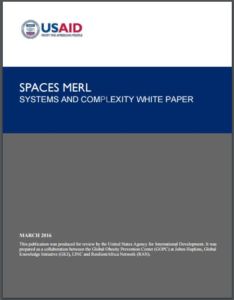
Working in collaboration with Johns Hopkins University, the Resilient Africa Network, and Global Knowledge Initiative, LINC recently authored the “Systems & Complexity White Paper”, a how-to manual for USAID missions, operating units and partners on the application of systemic design, monitoring & evaluation practices into international development programming. This White Paper is available for public download on the USAID website and includes content on:
- Defining Complex Systems
- Framework of Systems-based Approaches to Design, Monitoring and Evaluation
- Visualization Methods: Mapping and Modelling
- Narrative-based Approaches
- Indicator-based Approaches
This White Paper is an excellent resource for local and international development practitioners considering new methods for design and evaluation of their projects, ways in which local context and complexity can be more effectively captured and designed into program strategy. We encourage feedback on the methods described in this document or experiences that you have had in their application.
This activity has been conducted under the “SPACES MERL” project. The Strategic Program for Analyzing Complexity and Evaluating Systems (SPACES MERL) project is an activity funded by USAID’s Global Development Lab and the Bureau for Policy, Planning and Learning (PPL). This three-year activity aims to bring a variety of tools and methodologies that decision-makers can use to provide comprehensive systems analysis. The activity is being implemented from 2015 to 2018 by a consortium of organizations expert in systems and complexity, including the Global Obesity Prevention Center (GOPC) at Johns Hopkins University (Prime), Global Knowledge Initiative (GKI), LINC and Resilient Africa Network (RAN).
